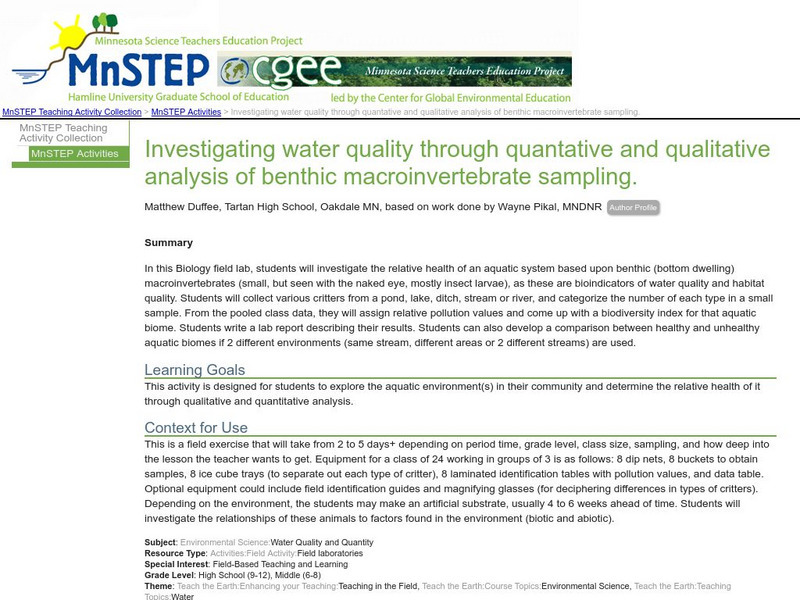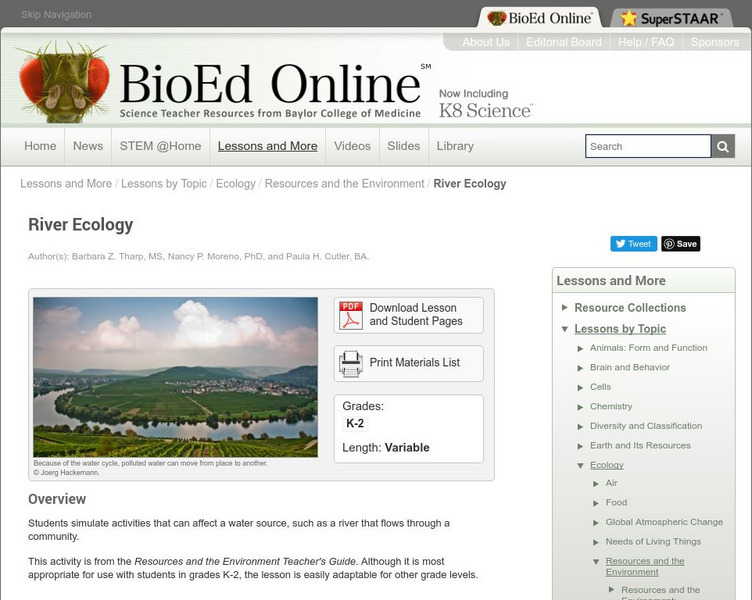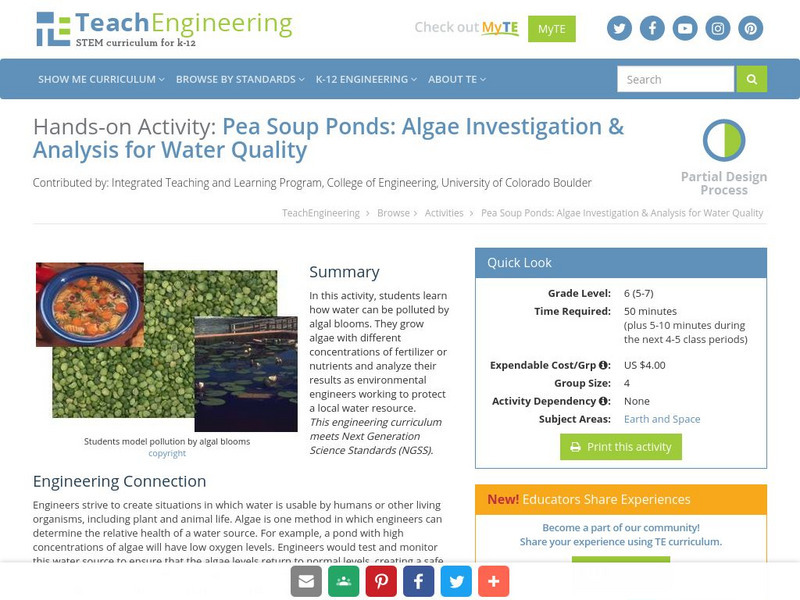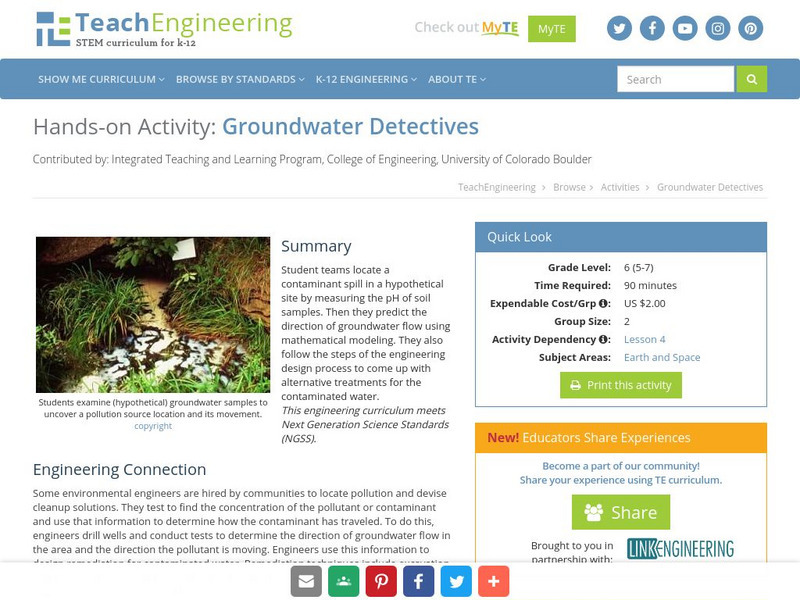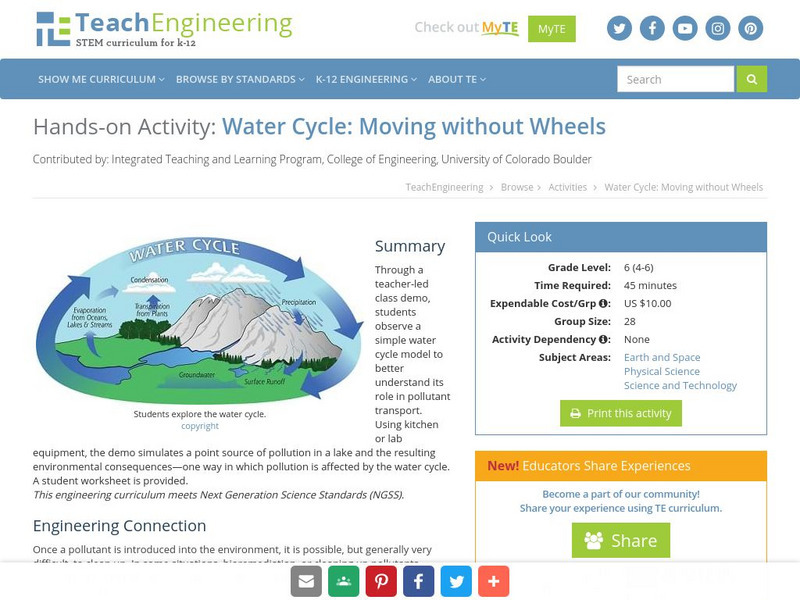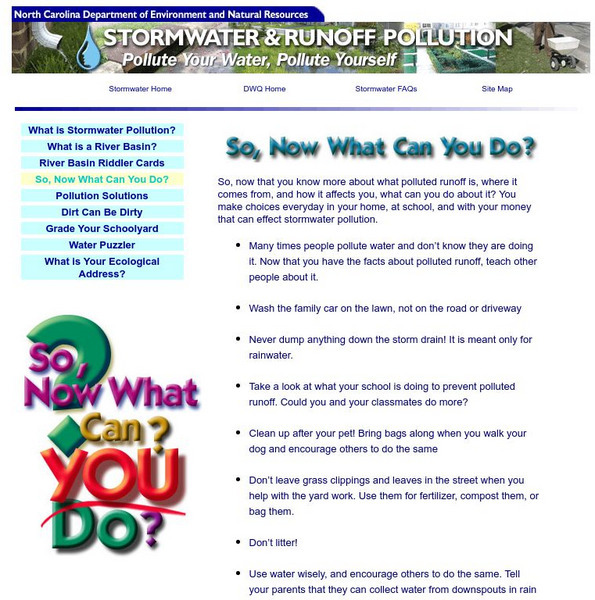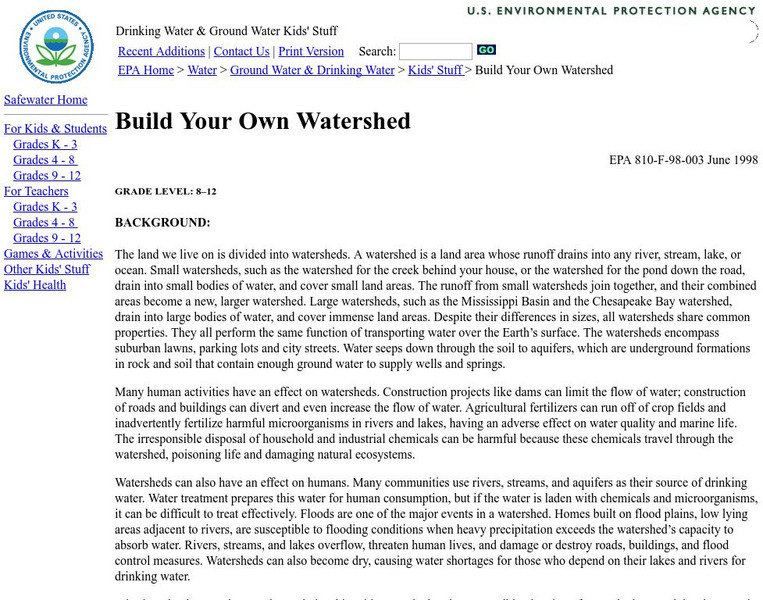US Geological Survey
Lake Pontchartrain Basin Foundation: Liquid Assets: Our Water Resources
Lessons designed to show learners how water quality, water pollution, and personal lifestyle are related. Lessons help students understand the importance of our water resources and water quality. Learners will explore the nonpoint and...
HotChalk
Hot Chalk: Lesson Plans Page: Causes of Pollution
This lesson plan is designed to teach young children identify the types of pollution, the sources of the pollution, and how they can protect the environment from further pollutants.
TeachEngineering
Teach Engineering: Would You Drink That?
This activity focuses on getting students to think about bacteria, water quality and water treatment processes. Students develop and test their hypotheses about the "cleanliness" of three water samples prepared by the teacher. Then they...
Science Education Resource Center at Carleton College
Serc: Investigating Water Quality Through Quantative and Qualitative Analysis
By looking at the bottom dwelling macroinvertebrates, students will investigate water quality and habitat quality in this field lab. Students will record the number of creatures found at the bottom of a pond, lake, ditch, stream or river...
Science Education Resource Center at Carleton College
Serc: Investigating Aquatic Ecosystems: Macroinvertebrates and Water Quality
Students will investigate three aquatic ecosystems (pond, stream, bog) to determine the relative pollution index and the water quality of each ecosystem. They will collect and analyze the benthic organisms found in each system and...
Science Education Resource Center at Carleton College
Serc: Healthy Waters
By the end of this lesson, young scholars will understand how we can use macroinvertebrates to determine the quality of water in a river or stream.
Government of Alberta
Alberta Environment: Focus on Groundwater: Groundwater Basics [Pdf]
This article explains in detail what groundwater is, why it is important, human activities that affect its quality and quantity, and things we can do to protect it.
Science Education Resource Center at Carleton College
Serc: Water Sheds and Water Quality
Included here is a collection of activities to teach students about watersheds and pollution.
abcteach
Abcteach: Earth Day Activities
[Free Registration/Login Required] How can you treat the earth with more respect? Check out this resource featuring links to elementary activities to celebrate Earth Day. You will find word searches, crossword puzzles, reading...
US Environmental Protection Agency
Epa: The Planet Protectors: Activities for Kids
Through this EPA resource, explore your environment and discover the animals, plants, air, and water around you. Learn how to protect the world we live in with fun games.
Science Education Resource Center at Carleton College
Serc: Mn Step: Water Runoff: How the Ground Water in Your Community Is Affected
After creating a model, students will investigate factors that affect water runoff both positively and negatively, and the impact this has on the quality of groundwater.
Texas Commission on Environmental Quality
Tceq: Lesson Plans & Resources for Teaching Environmental Sciences [Pdf]
A large collection of lesson plans on environmental topics. The lessons are broken up into the broad categories of air, water, and waste, and look at issues around quality, pollution, conservation, and recycling. There are activities for...
Nature Conservancy
The Nature Conservancy: Gardens Activity Guide: Water
In this guide helps students understand their garden as a model watershed through the collection and analysis of rainwater filtration data.[4.06]
BioEd Online
Bio Ed Online: River Ecology
In this lesson plan students are required to simulate activities that can affect a water source, such a river as it flows from one place to another within a community.
Science Education Resource Center at Carleton College
Serc: Investigating Ponds and Streams: How Clean Is Our Water?
In this field lab, students investigate the differences in three city ponds. Students will compare pond life, temperature, pH, Ammonia, dissolved oxygen, and Nitrate. The student use the pond sheets (Flinn Scientific Catalog 2007) to...
TeachEngineering
Teach Engineering: Pea Soup Ponds
In this activity, students will learn how water can be polluted by algal blooms. They will grow algae with different concentrations of fertilizer or nutrients and analyze their results as environmental engineers working to protect a...
TeachEngineering
Teach Engineering: Groundwater Detectives
Student teams locate a contaminant spill in a hypothetical site by measuring the pH of soil samples. Then they predict the direction of groundwater flow using mathematical modeling. They also use the engineering design process to come up...
TeachEngineering
Teach Engineering: Design, Build and Test Your Own Landfill
Students design and build model landfills using materials similar to those used by engineers for full-scale landfills. Their completed small-size landfills are "rained" on and subjected to other erosion processes. The goal is to create...
Science Education Resource Center at Carleton College
Serc: Using Benthic Marcoinvertebrates to Determine Biodiversity in a River
In this investigation of macroinvertebrates, students will build rock baskets and place them in various parts of a river to collect insects. Students will group insects according to their pollution tolerance and use the PTI to determine...
TeachEngineering
Teach Engineering: Moving Without Wheels
In a class demonstration, students observe a simple water cycle model to better understand its role in pollutant transport. This activity shows one way in which pollution is affected by the water cycle; it simulates a point source of...
TeachEngineering
Teach Engineering: Optimize! Cleaner Energy Options for Rural China
Students work in engineering teams to optimize cleaner energy solutions for cooking and heating in rural China. They choose between various options for heating, cooking, hot water, and lights and other electricity, balancing between the...
Other
Nc Department of Energy and Natural Resources: So, Now What Can You Do?
A list of ways people can make good choices in everyday activities so as not to contribute to stormwater pollution.
US Environmental Protection Agency
Epa: Build Your Own Watershed
How can you learn to build your own watershed? This site features an activity to illustrate the basic properties of a watershed. Don't miss out.
Environmental Education for Kids
Eek!: Teacher Resources: Groundwater Study Guide [Pdf]
This study guide is designed to help young scholars begin thinking about groundwater - where it comes from, why it's important, and how it can be conserved and protected. The guide includes a brief overview of groundwater, a glossary,...



